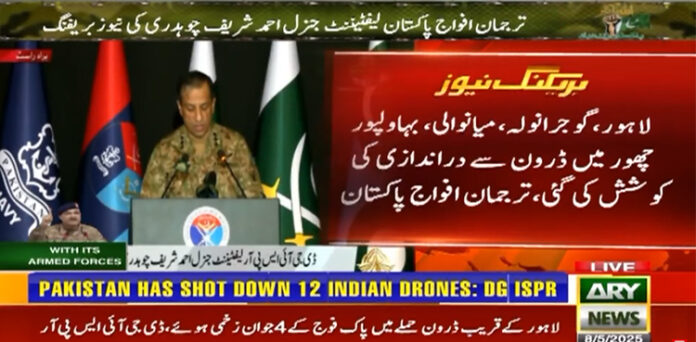How Are Indian Drones Entering Pakistan Undetected? The Nation Demands Answers
How Are Indian Drones Entering Pakistan Undetected? The Nation Demands Answers
In recent days, a wave of concern has swept across Pakistan following alleged drone attacks believed to have originated from Indian territory. These incidents have raised serious national security questions: How are Indian drones managing to breach Pakistani airspace? Why isn’t our defense system detecting and intercepting them? The public is demanding transparency, accountability, and immediate answers from the relevant authorities.
This blog explores the rising concerns, technical possibilities, and what the people of Pakistan deserve to know.
🚨 A Wake-Up Call for National Security
When drones can cross international borders and reach major Pakistani cities without being intercepted, it’s not just a security lapse—it’s a national emergency. Citizens from across the country are asking:
- How are these drones slipping past Pakistan’s air defense radar?
- Why are critical urban and military zones vulnerable?
- Where are the official responses and reassurances?
The silence is deafening—and dangerous.
🇵🇰 Public Trust Shaken: What the People Are Saying
From social media threads to television talk shows, the topic of Indian drones in Pakistan is dominating public discourse. Trending hashtags like #DroneAttackPakistan, #WhereIsOurDefense, and #PakAirspaceBreach highlight the rising anxiety among citizens.
Many are questioning:
- The role and readiness of our air surveillance systems
- The performance of agencies like PAF, ISPR, and civil aviation
- Whether modern drone warfare has outpaced our defense preparedness
This is not just about defending borders—it’s about restoring trust.
🤖 How Do Drones Cross Borders Undetected?
To understand how Indian drones may be entering Pakistan, we need to look at how drone technology works and why it’s so difficult to track:
1. Low Altitude Flying
Modern military drones can fly at extremely low altitudes, often below radar range. This allows them to avoid standard detection methods.
2. Small Radar Signature
Unlike fighter jets, drones—especially tactical or kamikaze drones—are often small and constructed with non-metallic parts, reducing their radar visibility.
3. Electronic Jamming and Stealth Tech
Advanced drones can use jamming signals to confuse radar systems or exploit gaps in coverage between radar zones.
4. Nighttime Infiltration
Drones often fly under the cover of darkness, when visibility is limited and response times are slower.
🛡️ Where Is Pakistan’s Air Defense?
Pakistan has a range of air defense tools including:
- Long-range radar systems
- Surface-to-air missile batteries
- Early warning aircraft
- Civilian and military surveillance coordination
So why did none of these detect or respond to recent drone incursions?
Analysts believe that either:
- The drones used new or advanced stealth technology, or
- There are blind spots in our radar coverage, especially in border areas
If true, these are vulnerabilities that need immediate fixing.
🇮🇳 Is India Using Drones as Provocation?
While there is official confirmation from the both sides that these drone intrusions could be part of India’s hybrid warfare strategy—using non-conventional methods to provoke or test Pakistan’s defenses.
This tactic aims to:
- Trigger panic
- Collect intelligence
- Damage infrastructure without boots on the ground
The Indian media has largely cheering, adding to suspicions and anger.
📢 What Pakistanis Expect From Officials
The people are not asking for war—they’re asking for answers. Here’s what Pakistani citizens demand:
✅ 1. Clear Government Statement
No more vague updates. Citizens deserve a transparent and unified response from the Ministry of Defense, ISPR, and the Prime Minister’s Office.
✅ 2. Independent Investigation
A parliamentary or judicial commission should be formed to investigate the incidents and submit findings to the public and culprit should be punish.
✅ 3. Upgrade in Defense Systems
If existing radar and air defense systems are outdated, it’s time to invest in modern anti-drone technology, including:
- Radar jammers
- Laser interception systems
- AI-powered drone detectors
✅ 4. Tougher Border Surveillance
The entire eastern border, especially near urban centers, must be reevaluated for air surveillance blind spots.
✅ 5. Diplomatic Accountability
If India is responsible, the Foreign Office must lodge a strong protest and take the matter to the United Nations or other global forums.
🗣️ Why This Matters to Every Pakistani
Drone attacks aren’t just military issues—they’re civilian issues. A single drone strike on a city hospital, power plant, or school could have devastating consequences.
If our skies aren’t safe, our homes, families, and futures aren’t either.
This isn’t fear-mongering. It’s a real and rising threat. And ignoring it only empowers those who want to test our limits.
📲 What Can You Do as a Citizen?
Until official channels respond, here’s how you can raise awareness and keep the pressure on:
- Use your voice: Share posts, write blogs, tweet, and raise questions.
- Tag responsible authorities: Let them know you expect answers.
- Stay informed: Follow reputable defense analysts and journalists.
- Demand transparency: Ask your local representatives to push for clarity.
🔚 Final Thoughts: Pakistan Deserves Straight Answers
In today’s world, drone warfare is no longer a future threat—it’s already here. If Indian drones are entering Pakistan without resistance, it’s not just a defense failure—it’s a leadership failure.
The people of Pakistan are not asking for military retaliation or war.
They’re asking for:
- Truth over vague statements
- Responsibility over excuses
- Action over press releases
This is not about demanding aggression—it’s about demanding accountability.
The public has every right to know:
- What exactly happened?
- How did these drones go undetected?
- Who is responsible for this failure?
- What steps are being taken to make sure it never happens again?
Until clear answers are given, the trust gap will only widen.
The people aren’t looking for counterattacks.
They’re looking for clarity, security, and leadership.
